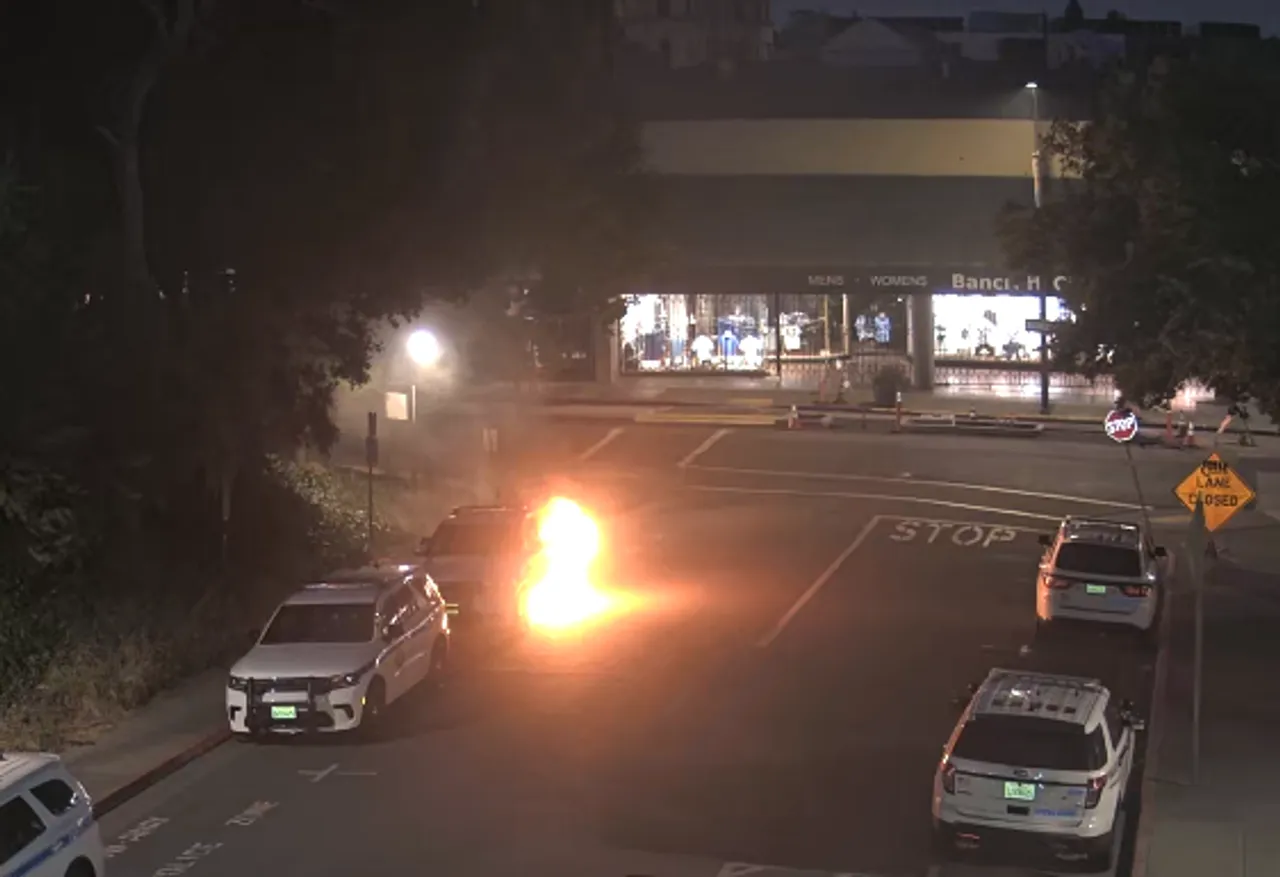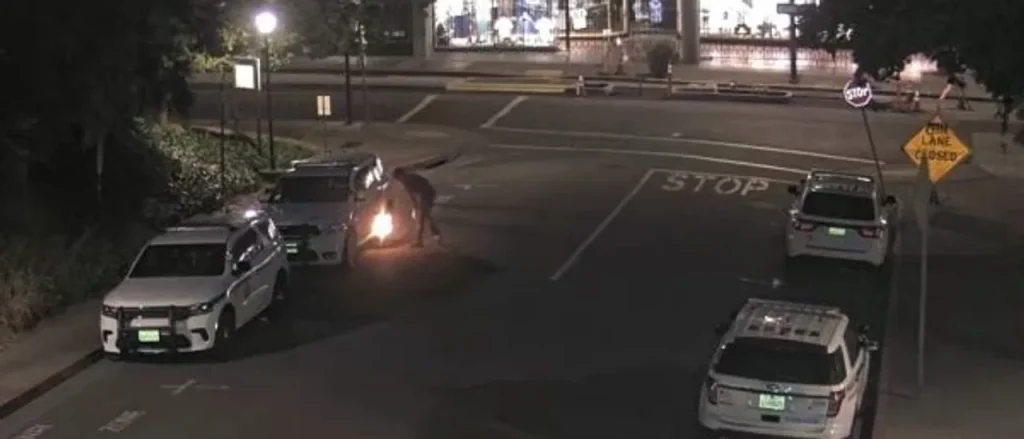A federal judge handed down a stiff sentence to a man who turned political rage into arson, and it matters. Casey Robert Goonan was sentenced to nearly 20 years in prison after a string of firebombings and arsons in the Bay Area. The court applied a terrorism enhancement, and the result should remind anyone tempted by violent activism that the system takes these attacks seriously.
On June 1, Goonan placed a bag of six incendiary devices under a UC Police Department patrol car near the UC Berkeley campus, an act caught on surveillance video. Ten days later he attacked an Oakland federal courthouse, throwing rocks in an attempt to toss Molotov cocktails inside before lighting devices at the side of the building. Prosecutors say he set at least three other campus fires that month and openly urged others to damage property in support of Palestine.

A police car catches on fire due to an arson attack at the University of California, Berkeley on June 1, 2024. (Image courtesy of Department of Justice)
Goonan pleaded guilty in January to maliciously damaging or destroying property used in or affecting interstate commerce by means of fire or an explosive. He admitted the attacks were inspired by the October 7 massacre in Israel, and prosecutors secured a terrorism enhancement. That label matters because it reflects the political motive and intent to intimidate or coerce a larger public beyond property damage.
The sentence was imposed by Senior U.S. District Judge Jeffrey White, a Bush appointee who did not mince words about the nature of the crime. White called the defendant a “domestic terrorist” during sentencing, underscoring the political nature and societal danger of the acts. The judge also ordered 15 years of supervised release and roughly $94,267 in restitution to compensate the victims and institutions harmed.
Goonan is no anonymous street thug; he has academic credentials and a record of activism that morphed into violence. He holds a bachelor’s degree in Ethnic Studies and a PhD in African American studies, a background that friends and colleagues said informed his worldview and political passion. But credentials do not excuse criminality, and the sentence recognizes that radical beliefs crossed a line into violent conduct.
“During my time as a student, I was introduced to the cause of Palestinian liberation and I became deeply engaged in questions of racial justice, socioeconomic equality, and human rights,” Goonan wrote in a letter to the court, a passage he put forward to explain the path that led him to violence. That line, exactly as written, lays out his claimed motives and the ideological seed that fed his actions. The court had to weigh personal narrative against the clear danger his acts posed to campus communities and federal employees.
“Having spent over a year in custody, I’ve had time to reflect on my actions more clearly … I recognize the potential harm my actions may have caused for the community and for my family and loved ones, as well as the harm my actions could have caused to the workers and students on campus, and workers in the federal building,” he also wrote, asking the court to consider his remorse. The plea of reflection is understandable, but remorse after capture doesn’t erase the real risk created by arson. The judge made that distinction when imposing a stiff sentence designed to protect the public.
“I am not an arsonist but an activist who in a manic fit of rage and desperation committed arson,” Goonan added, a line that blends mental-health claims with political framing. Courts must balance mental-health considerations with accountability when conduct endangers others. In this case the record showed repeated planning, multiple incidents, and a political motive that justified enhanced punishment.
Defense counsel asked for a sentence capped near eight years, citing the defendant’s struggles and medical concerns, including diabetes. Friends and some academic contacts submitted letters asking for mercy and contextualizing his life and scholarship. Those appeals matter to humanize a defendant, but they did not outweigh the need for deterrence and public safety.
The Department of Justice pursued the case as a serious threat to public order, and the result reflects that determination. When people invoke foreign terror attacks as inspiration for domestic violence, authorities cannot treat the acts as mere protests gone wrong. Labeling and prosecuting these crimes as domestic terrorism sends a clear message that politicized violence will be treated like what it is: an attack on the rule of law.
Why This Sentence Matters
From a Republican viewpoint, this case is a straightforward defense of law and order. Violent actors who hide behind ideology to burn, intimidate, or destroy must face consequences that match the harm they threatened. A nearly 20-year term paired with long supervised release and restitution is a proportional response that protects future potential victims.
Campuses must also reckon with the line between protest and criminal behavior, especially when activists radicalize into violence. Universities can be places of debate and dissent without becoming breeding grounds for arson and intimidation. Protecting students, staff, and the public means enforcing clear rules and cooperating fully with law enforcement when those rules are broken.
Mental illness and political conviction are complex issues, and courts should weigh them carefully, but they are not get-out-of-jail-free cards. The message from this sentence should be simple: ideology does not excuse attacking people, property, or federal institutions. Justice must be blind to excuses and clear-eyed about deterrence.
The hard outcome here is also a warning: glorifying or calling for violent acts in the name of a cause will bring consequences, regardless of academic credentials or political rhetoric. If anything, the sentence reinforces the principle that every person who contemplates violence will face a justice system that protects citizens and institutions. That protection is the core function of government and a principle Republicans across the country should continue to defend.

1 Comment
Now he can support Pissantstine from prison